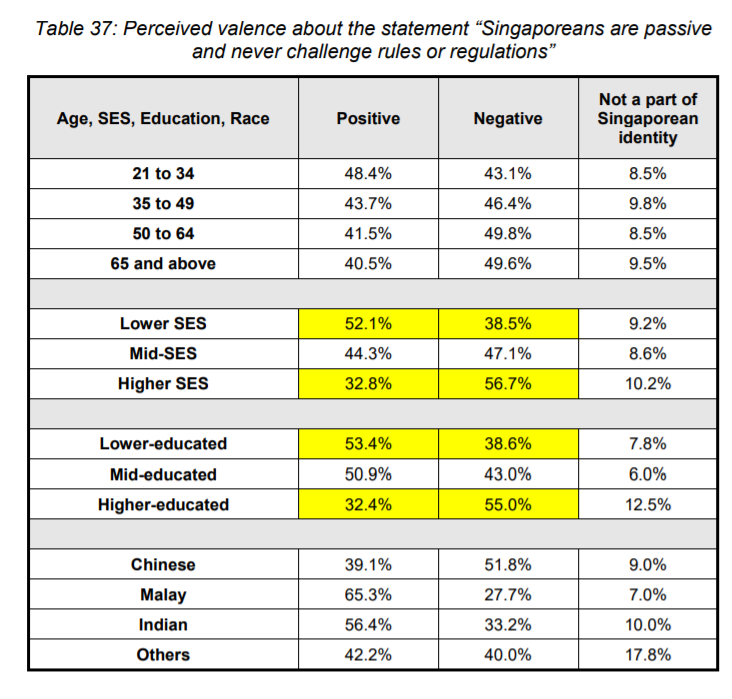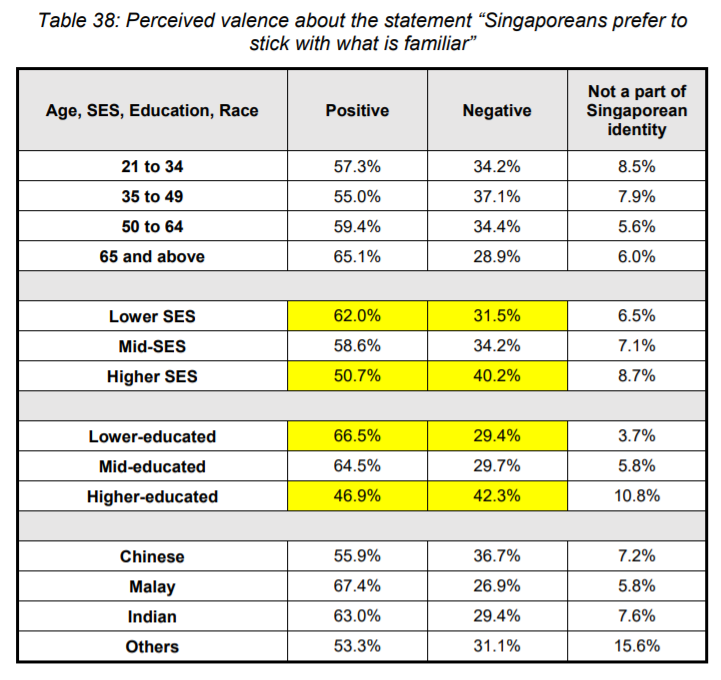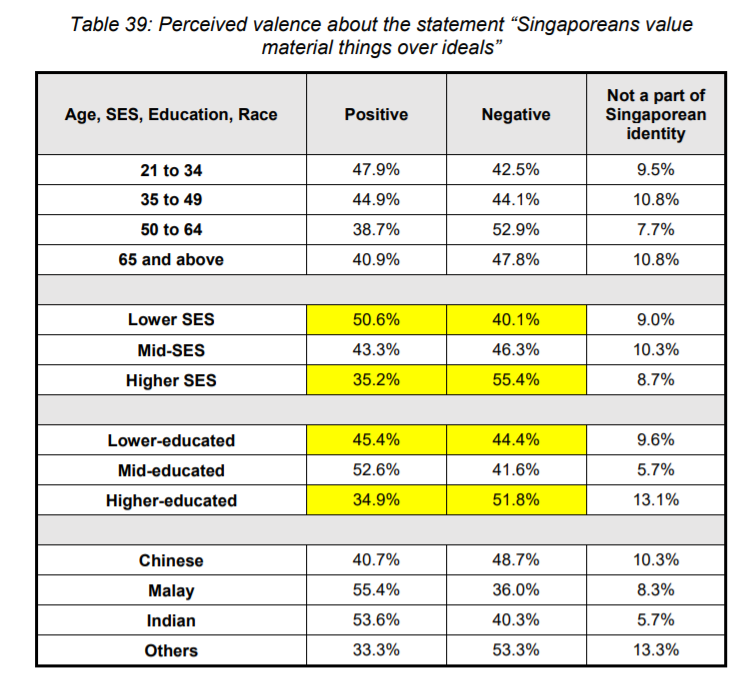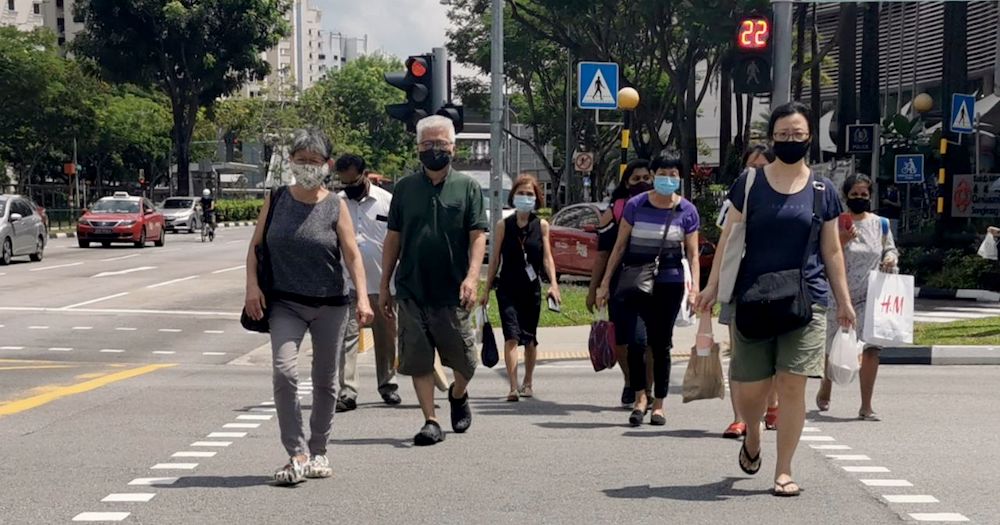Follow us on Telegram for the latest updates: https://t.me/mothershipsg
Singaporeans of lower socio-economic status (SES) and education levels see the traits of being passive and never challenging rules and regulations as a positive.
In contrast, Singaporeans of a higher SES and education levels see these traits as negative.
These were the findings of a study conducted by the Institute of Policy Studies (IPS), involving 2,001 Singapore Citizens and Permanent Residents (PRs), seeking to understand national identity and pride in the country amidst the backdrop of global events such as the Covid-19 pandemic and "identity politics movements" such as Black Lives Matter.
The study included examining the valence (positivity and negativity) and relevance of multiple traits commonly used to describe Singaporeans in a "stereotypical fashion".
With regard to challenging authority, defined as "Singaporeans are passive and never challenge rules or regulations," IPS found that 52.1 per cent of lower SES respondents and 53.4 per cent of those who had lower education levels saw these traits as positive, while 56.7 of high SES respondents and 55 per cent of the more highly educated saw these in a negative light.
 Source: IPS
Source: IPS
More high SES and higher-educated Singaporeans view risk-aversion as negative
The survey also found that a higher proportion of Singaporeans who were of higher SES and higher education background saw aversion to risk, defined as preferring to stick to the familiar, as a negative trait.
Here, 40.2 per cent of high SES and 42.3 per cent of higher-educated respondents viewed risk-aversion as negative.
In comparison, only 31.5 per cent of lower SES and 29.4 per cent of lower education respondents, along with 34.2 per cent of middle SES and 29.7 per cent of mid-educated respondents held the same view.
In addition, a majority of the lower-educated and mid-educated respondents held a positive view of risk aversion, at more than 64 per cent, while only 46.9 per cent of the higher-educated did so.
A majority of lower SES and middle SES respondents also had a positive view, at more than 58 per cent, while just over half of the high-SES at 50.7 per cent did so.
 Source: IPS
Source: IPS
More lower SES & lower-educated Singaporeans see materialism positively
As for materialism, defined by IPS as "Singaporeans valuing material things over ideals," IPS noted that the sharpest differences were also across SES and education levels.
Here, lower SES Singaporeans were more likely to see materialism positively, with 50.6 of them doing so, while only 35.2 per cent of the high SES replied the same.
In contrast, a majority of the high SES saw materialism negatively at 55.4 per cent while this figure stood at 40.1 per cent for the lower SES.
The higher-educated were also in the majority for seeing materialism negatively at 51.8 per cent compared to the lower-educated and mid-educated.
As for the higher-educated who saw materialism positively, this stood at 34.9, compared to a majority among the mid-educated (52.6 per cent) and 45.4 per cent of the lower-educated.
 Source: IPS
Source: IPS
How did the survey define SES and education levels?
The survey was conducted via household visits from Sep. to Nov. 2020, with 54.8 per cent of the respondents coming from a middle SES background (defined as living in a four-room or five-room HDB flat).
Meanwhile, 26.2 per cent of the respondents came from a lower SES background (defined as living in a HDB three-room and below) and 19 per cent were high SES (living in either private or landed property).
 Source: IPS
Source: IPS
As for education level, IPS noted that respondents were "generally highly-educated," with 40 per cent holding a degree and above, 34.4 per cent having attained a post-secondary school education (such as ITE) and diploma, and 25.6 per cent holding secondary school education and below.
 Source: IPS
Source: IPS
Follow and listen to our podcast here
Top photo by Zhangxin Zheng
If you like what you read, follow us on Facebook, Instagram, Twitter and Telegram to get the latest updates.
